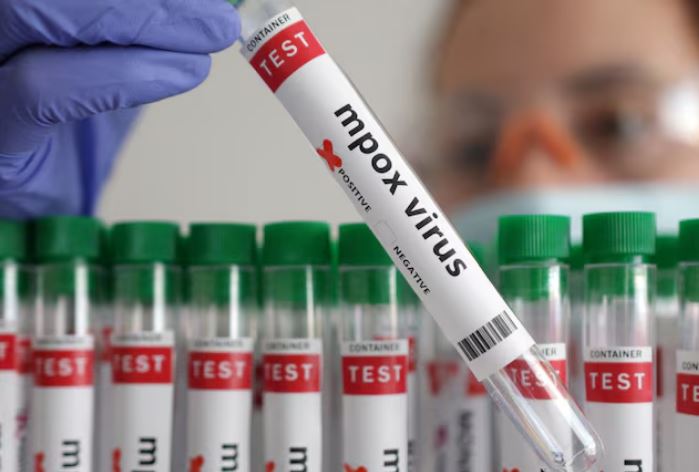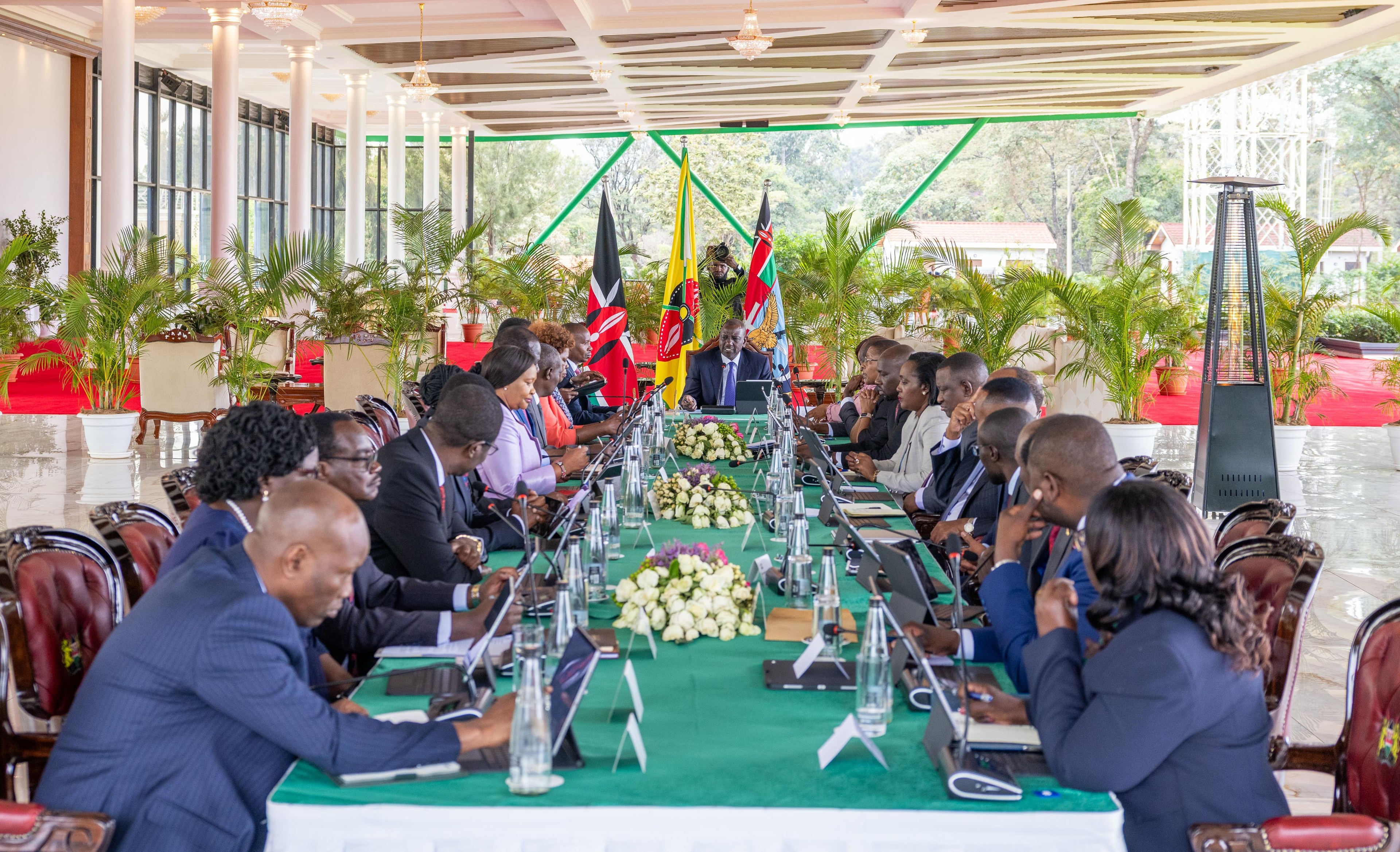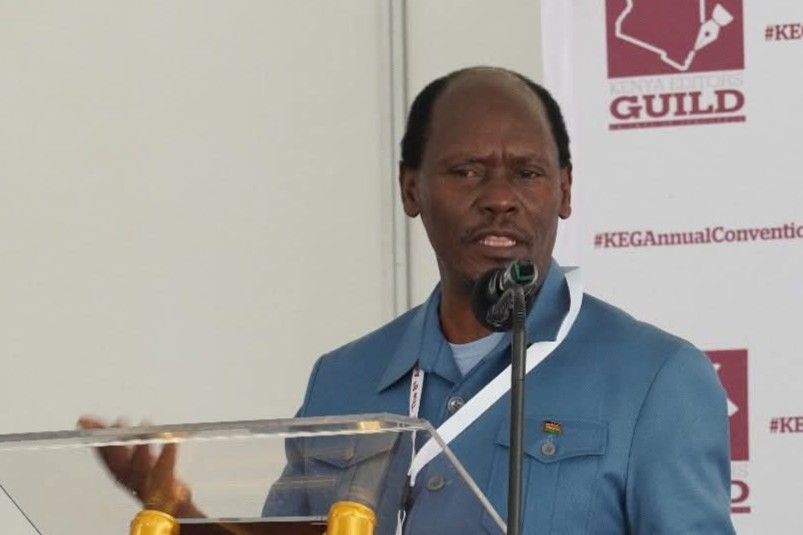
 A test tube labelled "Mpox virus positive" is held in this illustration./FILE
A test tube labelled "Mpox virus positive" is held in this illustration./FILE
The M-Pox outbreak continues to cause havoc across Africa, with 89,566 cases reported from 25 African Union member states.
According to the Africa CDC Epidemic Intelligence Report issued on July 28, 2025, of these cases, 28,048 — representing 31.32 per cent — are laboratory-confirmed.
The report adds that 554 deaths among the suspected cases and 186 deaths among confirmed cases have been reported from eight countries. In Kenya, 222 laboratory-confirmed cases and five deaths have been reported from 21 of 47 counties this year.
“This outbreak started in July 2024. Cumulatively, 253 laboratory-confirmed and six deaths (CFR: 2.37%) of m-pox have been reported from 21 of 47 counties in Kenya. A total of 779 samples were tested resulting in a 100% testing rate and 32.48% positivity rate,” the report says.
In an unrelated event, as the Africa CDC was releasing the report, China’s Ambassador to the AU Jiang Feng visited the Africa Centres for Disease Control and Prevention on July 25 and met with Director General Dr Kaseya.
The Chinese mission to the AU in a statement said Amb. Jiang emphasised that China and Africa are close friends, good partners, and true brothers.
“China has consistently supported Africa’s healthcare development, and this commitment remains unwavering regardless of policy shifts by other countries. Both sides should strengthen planning and implement steadily to jointly build an all-weather China-Africa community with a shared future in the new era,” it said.
It is in this context that China and Africa need to collaborate in curbing the spread of m-pox, drawing lessons learnt from the Covid-19 pandemic.
It is important to note that according to the Africa CDC, cases have surged in Uganda, Nigeria and Congo, while there have been improvements in Burundi, CAR, Kenya, Liberia and Rwanda. But m-pox has continued to spread beyond Africa, with China itself confirming a Clade 1a case on April 4, 2025. Four days later, according to the Africa CDC, Switzerland reported a case of Clade 1b.
This could easily become a global problem if early measures are not taken. However, with the international intervention in curbing the spread of COVID-19, Africa has an opportunity to seek collaborative efforts to deal with m-pox.
COVID-19 RESPONSE
The COVID-19 pandemic posed an unprecedented global challenge, disrupting health systems, economies, and societies across the world.
Many countries in Africa were exposed in terms of their poor public health infrastructure, which, even though exposing many people to death, offered an opportunity to improve the situation.
It is in this regard that China emerged as a significant partner to many African states, offering medical support, expertise, and material aid. Kenya, among others, was a key beneficiary of this cooperation, highlighting the growing China-Africa partnership in the health sector.
Many African states received medical assistance, personal protective equipment, vaccines, and knowledge-sharing platforms.
Amidst the vaccine inequality and apartheid, China delivered close to a billion vaccines to at least 40 countries on the continent.
China’s support was not just about aid, but also involved investing in health infrastructure, medical equipment, technical assistance, and knowledge sharing, as well as investment in vaccine facilities.
These collaborations have continued years after the COVID-19 outbreak.
In early June, Health Cabinet Secretary Aden Duale announced plans to establish local vaccine and pharmaceutical production hubs through a joint initiative with the Chinese government.
Following a meeting with China Ambassador Guo Haiyan on June 6, the rollout of the $500 million (Sh64.7 billion) project expected to position Kenya as a continental leader in health product manufacturing by 2028, was announced.
Duale said the partnership seeks to strengthen local supply chains, reduce Kenya’s reliance on imports, and create new jobs in line with the government’s development agenda.
This multi-layered support has helped Kenya manage the health crisis more effectively and strengthened the perception of China as a reliable partner.
CHINA-AFRICA COLLABORATION
This has expanded to other African states as well. In fact, there exists a commitment between the Africa CDC and the China Centres for Disease Control and Prevention (China CDC) to enhance their collaboration in advancing public health in Africa.
In the commitment made during a visit by China CDC Director General Dr. Shen Hongbing to the AU, both parties agreed to strengthen disease diagnosis, infectious disease, workforce development, outbreak response, surveillance and early warning in Africa.
It is a great opportunity for Africa and China to seize this opportunity to utilise this commitment and, using lessons learnt from Covid-19 interventions, curb the m-pox spread.
LESSONS
Among the lessons learnt were strengthening public health infrastructure, whereby China has and can support African countries in building and upgrading healthcare facilities, laboratories, and research centres. And just like in Kenya, there is an opportunity for local vaccine production and technology transfer.
Other lessons include workforce development and equipping, digital health and telemedicine, as well as early warning and epidemic surveillance systems, which were almost non-existent in many African states.
The COVID-19 pandemic has underscored the importance of resilient health systems and international collaboration.
For China and Africa, especially countries like Kenya, the pandemic has opened a new chapter in health diplomacy and cooperation.
There are several lessons and opportunities for enhancing this partnership moving forward, particularly with emerging transboundary outbreaks.
While the pandemic posed immense challenges, it also served as a catalyst for deepening health cooperation between China and Africa.
By building on the foundations laid during the crisis—through infrastructure investment, knowledge exchange, and mutual commitment—China and Africa can forge a more resilient and equitable global health partnership in handling other emergent health challenges such as m-pox.







![[PHOTOS] Ruto present as NIS boss Noordin Haji's son weds](/_next/image?url=https%3A%2F%2Fcdn.radioafrica.digital%2Fimage%2F2025%2F11%2Ff8833a6a-7b6b-4e15-b378-8624f16917f0.jpg&w=3840&q=100)










